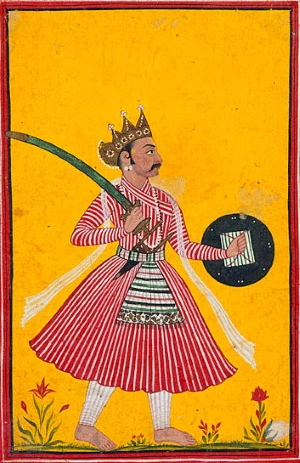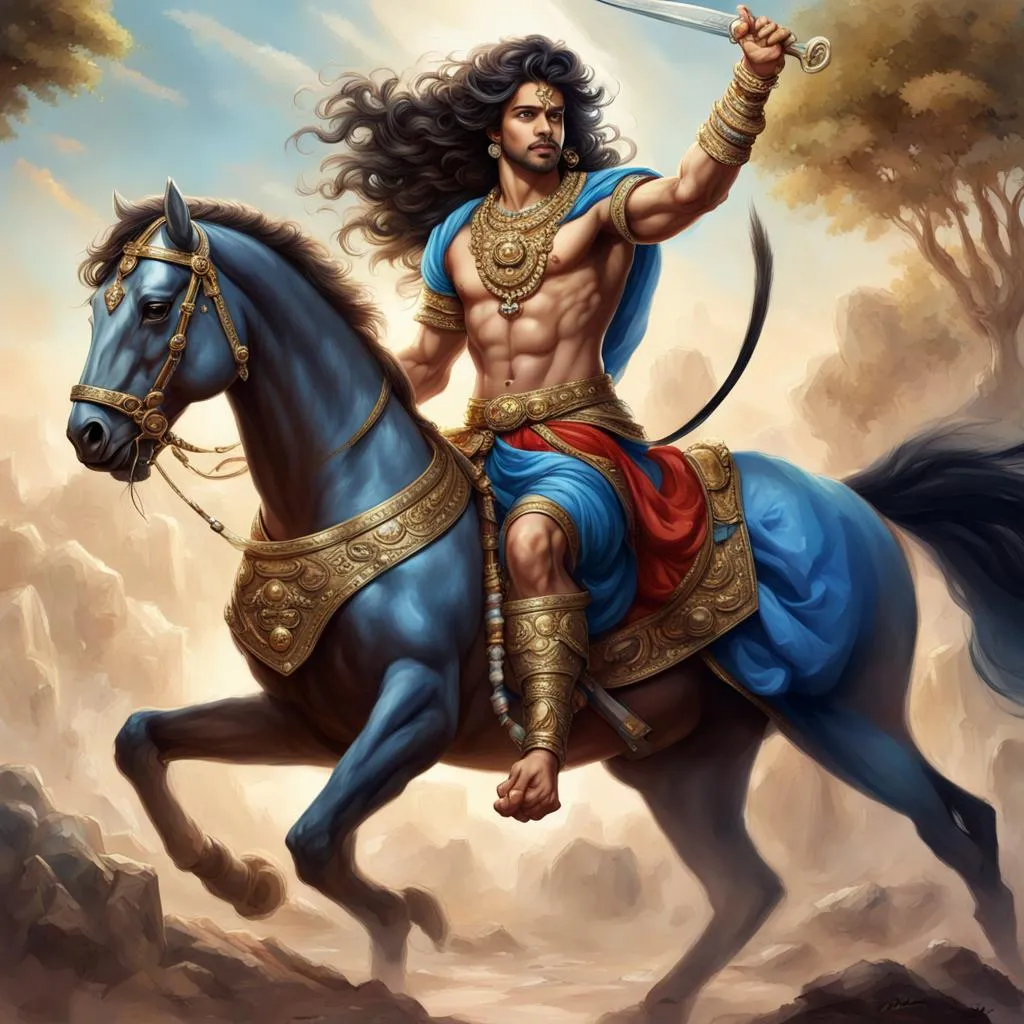When we think of the Mahabharata, names like Arjuna, Bheema, and Krishna immediately come to mind. But among the Pandavas, Nakula is often overlooked. However, his story is filled with wisdom, devotion, and strength in a way that makes him a true hero. Nakula was not just a warrior but also a symbol of humility, loyalty, and skill.
In this blog, I will take you on a journey to explore Nakula’s life, his role in the Mahabharata, his virtues, and the deep spiritual lessons he embodies. By the end, you’ll see Nakula as more than just one of the Pandavas – he was a warrior, a healer, and an embodiment of grace and dedication.
Who Was Nakula?
Nakula was the fourth of the Pandavas, born to Madri through the blessings of the Ashwini Kumaras, the celestial twin physicians. This divine heritage made him exceptionally handsome and skilled in the art of warfare, particularly with swords. But beyond his appearance and combat skills, Nakula was a man of great intellect and compassion.
From his childhood, Nakula was known for his humility and obedience. He was deeply attached to his twin brother, Sahadeva, and was a devoted follower of his elder brothers, Yudhishthir and Bheema.
What Made Nakula Special?
1. His Exceptional Swordsmanship
Nakula was considered one of the best swordsmen of his time. While Arjuna was a master archer, Nakula excelled in close combat, making him an essential force on the battlefield.

During the Kurukshetra war, Nakula defeated several prominent warriors, including Karna’s son, Chitrasena, and the mighty Kaurava general, Shakuni’s son, Uluka. His skill with the sword was unmatched, and his agility on the battlefield made him a formidable warrior.
2. His Beauty and Grace
Nakula was known as the most handsome man of his time. His celestial lineage gave him an extraordinary charm, but what truly set him apart was his grace in character. Unlike many who might be arrogant about their looks, Nakula was humble and kind. His beauty was not just external; it reflected in his actions and behavior.
3. His Role in the Kurukshetra War
Although Nakula was not as glorified as Arjuna or Bheema, his contributions to the war were crucial. He fought valiantly and protected Yudhishthir, ensuring the Pandava army’s strength remained intact. He also played a significant role in defeating key warriors on the Kaurava side, proving his mettle as a warrior.
One of his most remarkable moments was his battle against Shalya, his own maternal uncle. Despite the emotional conflict, Nakula did not hesitate to fight for Dharma, showing his unwavering commitment to justice.
Nakula’s Spiritual Significance
Beyond his skills as a warrior, Nakula teaches us profound spiritual lessons that are relevant even today:
1. Humility and Grace
Despite his extraordinary beauty and skill, Nakula remained humble. This is a great lesson in life – true greatness does not come from external appearance or achievements but from how we treat others.

2. Dedication and Loyalty
Nakula’s devotion to his brothers, especially Sahadeva, was unbreakable. He never sought personal glory but always stood by his family. This teaches us the importance of loyalty and dedication in our relationships.
3. Mastery and Discipline
Nakula was not just a warrior but also a skilled horseman and healer. His ability to treat wounds and care for horses showed his deep understanding of life’s interconnectedness. This reminds us that true wisdom comes from mastering multiple skills and using them for the greater good.
4. Detachment and Dharma
When the Pandavas set out on their final journey to the Himalayas, Nakula was among the first to fall. Yudhishthir revealed that Nakula’s attachment to his physical beauty was his weakness. This teaches us that attachment to the material world can hinder spiritual growth, and we must learn to detach ourselves from superficial identities.
Memorable Incidents and Quotes
- The Yaksha Prashna – A Test of Wisdom
One of the most significant incidents in Nakula’s life was the Yaksha Prashna, where a divine being tested the Pandavas. Yudhishthir was allowed to revive one of his brothers, and he chose Nakula instead of the powerful Bheema or the skilled Arjuna. When asked why, Yudhishthir replied that his mother Kunti already had a surviving son (himself), but Madri’s lineage would end if Nakula was not revived. This decision reflected Dharma over personal preference. This moment teaches us fairness and righteousness – that true Dharma is about balance and justice, not personal bias. - Nakula’s Skill as a Horse Whisperer
Nakula was known for his deep connection with animals, especially horses. He was considered an expert in Ayurveda and veterinary science, a skill he used to heal and nurture life. His ability to understand and communicate with horses showed his sensitivity and wisdom, reminding us that kindness extends beyond humans. - Nakula’s Battle with Shalya
Despite Shalya being his maternal uncle, Nakula did not hesitate to fight him in battle when needed. This demonstrated his ability to separate personal emotions from his duty toward Dharma. It is a lesson in prioritizing what is right over personal relationships when justice is at stake.
Why Nakula’s Story Matters Today
In today’s world, where external beauty, recognition, and power are given so much importance, Nakula’s story serves as a reminder that true worth lies in humility, discipline, and inner strength.
We often hesitate to acknowledge our strengths for fear of appearing arrogant. Nakula teaches us that we can embrace our gifts without letting them consume us. He was strong, beautiful, and intelligent but never let these qualities turn into arrogance.
From a spiritual perspective, Nakula’s journey highlights that attachment to worldly attributes can hold us back. His fall in the final journey of the Pandavas was due to his attachment to his beauty, showing that even the greatest souls have their flaws. But acknowledging and learning from them is the key to true liberation.
To conclude, Nakula was not just a warrior; he was a healer, a devoted brother, and a symbol of grace. As Krishna said in the Bhagavad Gita: “Dharma will always triumph in the end.” Nakula’s story is a testament to that eternal truth.
So, the next time you think of Nakula, remember: he was not just a handsome warrior but a man of virtue, wisdom, and unwavering dedication. May we all find the humility and strength to walk the path of Dharma, just as he did.

